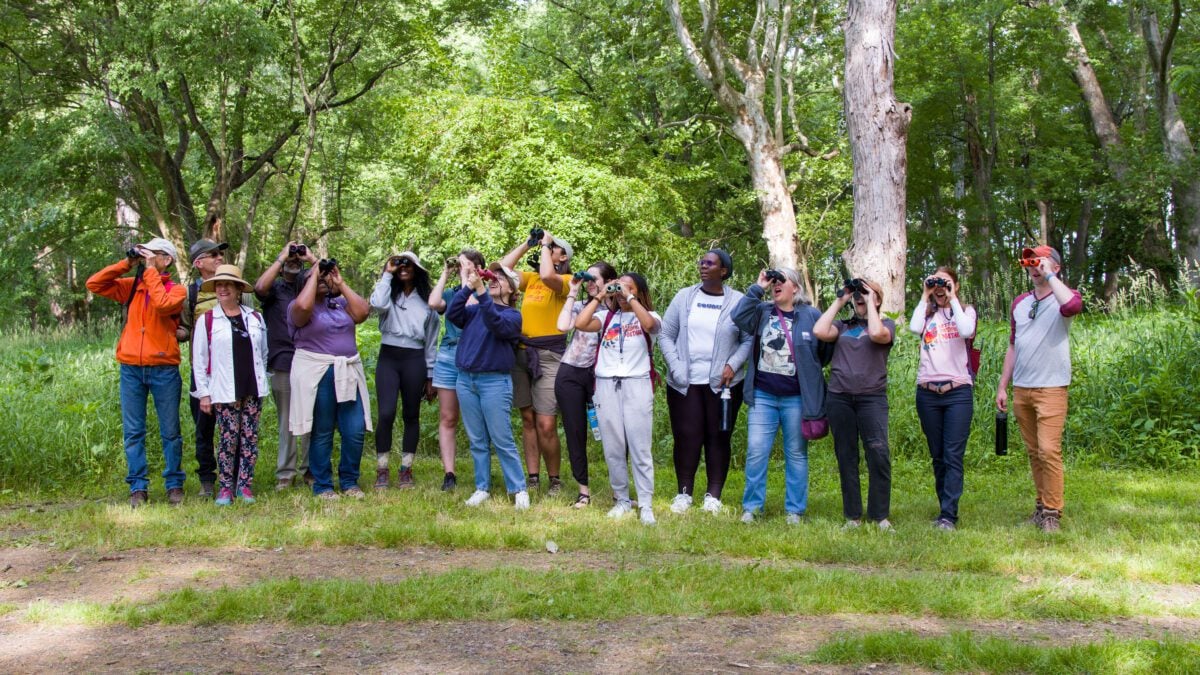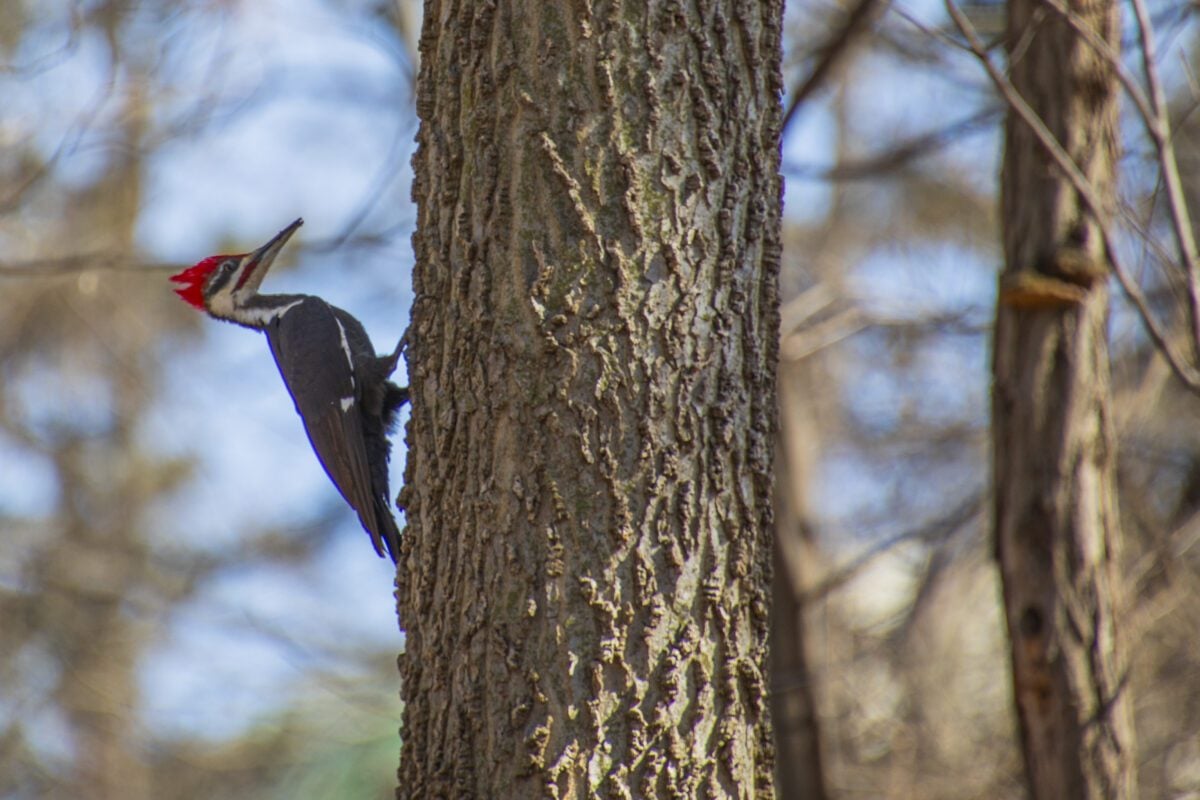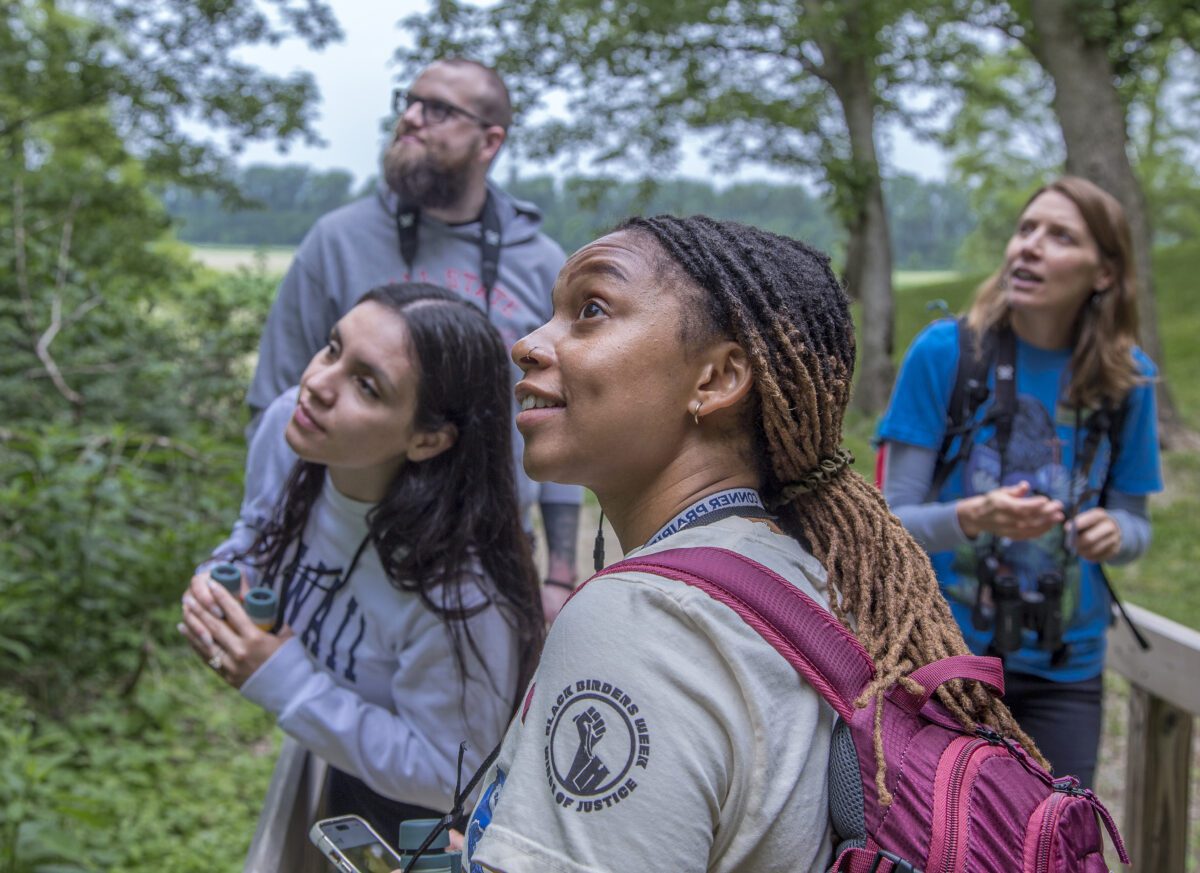
On a cool Sunday morning when storm clouds loomed, a handful of birdwatchers gathered at Conner Prairie for Indiana’s first Black Birders week.
Participants trekked the muddy trail into dense woods where they used binoculars to peer at birds.
Contrasted against the forest green stood the deep blue feathers of an indigo bunting and the orange underbelly of a Baltimore Oriole. The birds flitted between branches, entrancing viewers.
With that Sunday bird walk, Conner Prairie soared into a week of programming.
Organized by the collective Black AF in STEM, the week’s theme was “Wings of Justice.”
Events throughout the week, featuring bird walks, a sunset stroll and a Pride Hike, aimed to uplift diverse audiences. Keeping with the theme, a special Black Birders episode of the “This is Problematic!” podcast was released to bring visibility to the racism embedded in ornithology’s origins.
Bird walking while Black
After Christian Cooper was falsely accused of harassing a woman while birdwatching in 2020, his interaction prompted conversations about racial inequity.
Seeing the need for change, a collective of Black professionals banded together to promote visibility for Black people interested in STEM and natural sciences.
This collective became Black AF in STEM.
That same year, the organization created the first annual Black Birders Week to amplify the voices of Black birders and promote inclusivity.
Now, for the first time, it has come to Indiana.
Conner Prairie soars onto the scene
Hosting the week was Conner Prairie, a museum that partnered with Black AF in STEM for the occasion.
Leading the events were Michelle Morton — a nature engagement specialist and avid birdwatcher — and Zoe Morgan, a Black birder, curriculum specialist and co-host of the museum’s “This is Problematic!” podcast.
When preparing, the two acknowledged Conner Prairie’s contentious history — one marked by controversies such as a slavery reenactment exhibit — and how that history might make Black visitors wary of participating.
“There’s been a lot of harm that has been done by (the museum) on communities of color with some of our previous programming,” Morgan said.
Since 2019, the institution has made strides to promote new, inclusive programming. Black Birders Week is part of that.
Yet, Morgan noted that more work is needed to repair the damage.
“Because of that (history), understandably there’s a lot of reluctance and resistance to coming out here,” Morgan said. “There’s a lot that needs to happen for healing to truly occur…This is just the start of that.”
A foul-feathered past
When working on the most recent episode of “This is Problematic!”, Morgan and Nicole Jackson, a member of Black AF in STEM’s leadership team, discussed ornithology, the study of birds.

“We dive into the problematic history and (ornithology’s) roots in racism and colonialism, how that’s still affecting Black and brown people in the field of STEM and their fieldwork and research today,” Morgan said.
Embedded in that history, Morgan said, is John Audubon, known for identifying and illustrating birds in his book, “The Birds of America,” which was foundational to the field.
Because of this legacy, Audubon became the eponym of the National Audubon Society, an organization dedicated to conserving birds and their environments.
However, Audubon was also a racist and a slaveowner. And that’s not all.
Many of his observations were stolen from Black and indigenous people, Morgan said.
“Obviously, they never received the proper credit for that, and so that’s trickled down into the community as well like that’s kind of the foundation for what the field has been,” Morgan said.
Like the Audubon name, Morgan also noted how many bird names come from racists and slaveowners, something which led the American Ornithological Society to start an effort to change these names.
Morgan emphasized how this history makes the week so necessary.
“As a Black birder, hearing that (history), I don’t feel safe in this field that continues to perpetuate these past harms that have been done for centuries,” Morgan said. “That has led to us shedding light on that and … to make this a community that feels inclusive and safe to everyone, but especially for Black and brown people in the field.”
Finding feathered friends
The weeklong event, the result of Morgan and Morton’s efforts, was a treat to participants.
With the help of handy binoculars provided by the museum, the two helped visitors find their “spark bird” at a bird walk. A “spark bird” describes a bird that “sparks” people to become birdwatchers, Morton said.

After the walk, one of the bird watchers, Brandon Rogers, talked about his love for birdwatching.
“(Birdwatching) is often the chance to slow down my thinking and just appreciate what’s around me,” Rogers said. “I spend a lot of my work life on computers and on my phone and it has a certain pace … So, coming out and birding, I feel my whole self slow down so I can really appreciate the birds for what they are.”
In addition to this mindfulness, Morton noted that birding can promote other important mentalities as well.
“I think birds and enjoying them is really a great way into that environmental stewardship mindset,” Morton said. “Whether that happens here or outside of here, we just want people to be outside feeling safe and enjoying nature.”
Morton and Morgan both stressed the importance of uplifting Black Birders and said they hope to make the week a tradition by hosting it in future years.
“This needs to happen everywhere,” Morton said. “We have a lot of these national months of recognition … and the more awareness around that can only be for the better. So, bringing that awareness to our own community and beyond, I just see that to be beneficial.”
Contact Indianapolis Recorder Intern Kayla Barlow at kaylab@indyrecorder.com.






